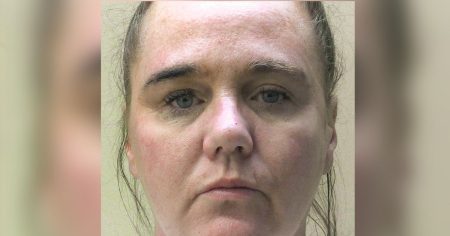Jordan Carrie was sentenced to five years in prison for hurting his baby son, who suffered brain damage after being violently shaken by his father in June 2020. The baby’s mother, Keeleigh Watts, was also found guilty of letting serious harm happen to their child, but was given a lesser sentence and probation due to her lesser role in the incident and her potential for rehabilitation. The child, who is recovering well after the traumatic event, had to be put into a deep sleep while doctors attended to his injuries. Concerns had been raised about Carrie’s handling of the baby, with reports of him being “heavy handed” and losing patience with the infant during a 4 a.m. feed. Despite Watts’ worries about leaving the baby alone with Carrie, she agreed to go back to bed while he looked after the baby, leading to the tragic incident.
During the trial, it was revealed that Carrie struggled with the demands of being a parent and didn’t take proper care of his son, going against the advice of the baby’s mother and grandmother. The judge noted that Carrie was strict, lacked patience, and possibly had underlying mental health issues such as ADHD or Autism, though there was no medical confirmation. The judge also criticized Watts for putting her partner before her child, despite having been warned about his behavior. Watts was described as weak in protecting her son and failing to acknowledge the potential risks posed by Carrie. Despite being devoted to her son, Watts prioritized her relationship with Carrie and neglected to protect her child. She was ordered to undergo rehabilitation activity and community service as part of her probation, with her prison sentence suspended for two years.
The judge highlighted Carrie’s failure to handle the challenges of parenting, his violent actions towards his son, and his subsequent lies to doctors and the police about the incident. Carrie’s lack of respect for the baby’s needs and his inability to control his emotions were major factors in the court’s decision to hand down a significant prison sentence. In contrast, Watts was seen as a victim of domestic violence, often prioritizing her partner’s needs over those of her child to avoid further violence at home. Despite showing potential for change through participation in relationship programs, Watts was still held accountable for her role in the harm caused to her son. The judge acknowledged the difficulty of not being able to care for her son personally and the emotional toll it would take on her.
The court proceedings shed light on the tragic consequences of domestic violence and the damaging impact it can have on innocent children. The case serves as a reminder of the importance of recognizing warning signs in relationships and prioritizing the safety and well-being of children above all else. Both parents were held responsible for the harm inflicted on their child, with Carrie facing a significant prison sentence for his violent actions and lies, while Watts was given a chance at rehabilitation and probation due to her potential for change. The courtroom drama serves as a cautionary tale about the dangerous consequences of failing to protect vulnerable children from harm within the confines of the family unit.















